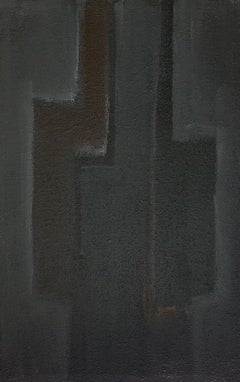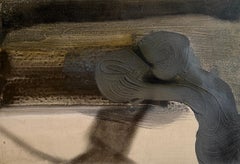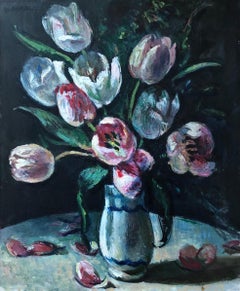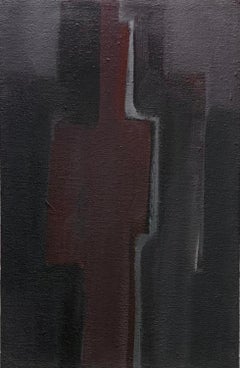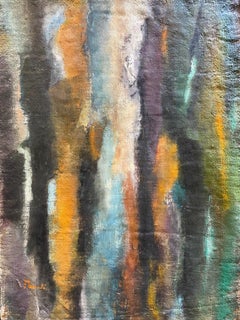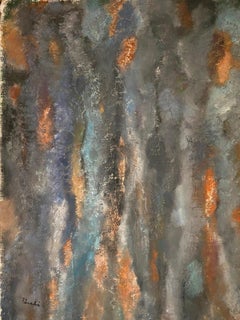Switzerland - Art
to
882
1,856
933
1,030
567
1,106
Overall Width
to
Overall Height
to
18
127
2,889
2,458
21
34
80
98
189
275
436
289
160
194
17
1,512
943
765
229
228
166
94
60
56
33
28
20
17
1
2,699
2,167
422
1,905
1,083
702
600
548
479
454
444
411
332
304
262
246
217
217
212
184
167
152
132
2,417
1,793
662
569
468
179
114
103
95
93
1,622
1,553
232,143
151,507
Item Ships From: Switzerland
"Présence" Collection - N°17 by Gilbert Pauli - Acrylic on Canvas
By Gilbert Pauli
Located in Geneva, CH
Born in 1944 in the canton of Fribourg, Gilbert Pauli currently lives in Geneva, where he devotes himself to painting and sculpture, a passion he developed from his childhood. His fa...
Category
21st Century and Contemporary Abstract Switzerland - Art
Materials
Acrylic
$1,000 Sale Price
71% Off
Abstract composition
Located in Genève, GE
Work on canvas
Category
20th Century Abstract Switzerland - Art
Materials
Oil
Bouquet of tulips
Located in Genève, GE
Work on canvas
Category
1940s Switzerland - Art
Materials
Oil
"Présence" Collection - N°15 by Gilbert Pauli - Acrylic on Canvas 45x70 cm
By Gilbert Pauli
Located in Geneva, CH
Born in 1944 in the canton of Fribourg, Gilbert Pauli currently lives in Geneva, where he devotes himself to painting and sculpture, a passion he developed from his childhood. His fa...
Category
21st Century and Contemporary Abstract Switzerland - Art
Materials
Acrylic
"Juger" by Gilbert Pauli - Oil on burlap 68x98 cm
By Gilbert Pauli
Located in Geneva, CH
Born in 1944 in the canton of Fribourg, Gilbert Pauli currently lives in Geneva, where he devotes himself to painting and sculpture, a passion he developed from his childhood. His fa...
Category
21st Century and Contemporary Abstract Switzerland - Art
Materials
Burlap, Oil
$1,470 Sale Price
30% Off
"Fêter" by Gilbert Pauli - Oil on burlap 68x98 cm
By Gilbert Pauli
Located in Geneva, CH
Born in 1944 in the canton of Fribourg, Gilbert Pauli currently lives in Geneva, where he devotes himself to painting and sculpture, a passion he developed from his childhood. His fa...
Category
21st Century and Contemporary Abstract Switzerland - Art
Materials
Burlap, Oil
$1,470 Sale Price
30% Off
Marc Chagall - Original Lithograph
By Marc Chagall
Located in Collonge Bellerive, Geneve, CH
Marc Chagall
Original Lithograph
1963
Dimensions: 32 x 24 cm
Reference: Chagall Lithographe 1957-1962. VOLUME II.
Unsigned edition of over 5,000
Condition : Excellent
Marc Chagall (born in 1887)
Marc Chagall was born in Belarus in 1887 and developed an early interest in art. After studying painting, in 1907 he left Russia for Paris, where he lived in an artist colony on the city’s outskirts. Fusing his own personal, dreamlike imagery with hints of the fauvism and cubism popular in France at the time, Chagall created his most lasting work—including I and the Village (1911)—some of which would be featured in the Salon des Indépendants exhibitions. After returning to Vitebsk for a visit in 1914, the outbreak of WWI trapped Chagall in Russia. He returned to France in 1923 but was forced to flee the country and Nazi persecution during WWII. Finding asylum in the U.S., Chagall became involved in set and costume design before returning to France in 1948. In his later years, he experimented with new art forms and was commissioned to produce numerous large-scale works. Chagall died in St.-Paul-de-Vence in 1985.
The Village
Marc Chagall was born in a small Hassidic community on the outskirts of Vitebsk, Belarus, on July 7, 1887. His father was a fishmonger, and his mother ran a small sundries shop in the village. As a child, Chagall attended the Jewish elementary school, where he studied Hebrew and the Bible, before later attending the Russian public school. He began to learn the fundamentals of drawing during this time, but perhaps more importantly, he absorbed the world around him, storing away the imagery and themes that would feature largely in most of his later work.
At age 19 Chagall enrolled at a private, all-Jewish art school and began his formal education in painting, studying briefly with portrait artist Yehuda Pen. However, he left the school after several months, moving to St. Petersburg in 1907 to study at the Imperial Society for the Protection of Fine Arts. The following year, he enrolled at the Svanseva School, studying with set designer Léon Bakst, whose work had been featured in Sergei Diaghilev's Ballets Russes. This early experience would prove important to Chagall’s later career as well.
Despite this formal instruction, and the widespread popularity of realism in Russia at the time, Chagall was already establishing his own personal style, which featured a more dreamlike unreality and the people, places and imagery that were close to his heart. Some examples from this period are his Window Vitebsk (1908) and My Fianceé with Black Gloves (1909), which pictured Bella Rosenfeld, to whom he had recently become engaged.
The Beehive
Despite his romance with Bella, in 1911 an allowance from Russian parliament member and art patron Maxim Binaver enabled Chagall to move to Paris, France. After settling briefly in the Montparnasse neighborhood, Chagall moved further afield to an artist colony known as La Ruche (“The Beehive”), where he began to work side by side with abstract painters such as Amedeo Modigliani and Fernand Léger as well as the avant-garde poet Guillaume Apollinaire. At their urging, and under the influence of the wildly popular fauvism and cubism, Chagall lightened his palette and pushed his style ever further from reality. I and the Village (1911) and Homage to Apollinaire (1912) are among his early Parisian works, widely considered to be his most successful and representative period.
Though his work stood stylistically apart from his cubist contemporaries, from 1912 to 1914 Chagall exhibited several paintings at the annual Salon des Indépendants exhibition, where works by the likes of Juan Gris, Marcel Duchamp and Robert Delaunay were causing a stir in the Paris art world. Chagall’s popularity began to spread beyond La Ruche, and in May 1914 he traveled to Berlin to help organize his first solo exhibition, at Der Sturm Gallery. Chagall remained in the city until the highly acclaimed show opened that June. He then returned to Vitebsk, unaware of the fateful events to come.
War, Peace and Revolution
In August 1914 the outbreak of World War I precluded Chagall’s plans to return to Paris. The conflict did little to stem the flow of his creative output, however, instead merely giving him direct access to the childhood scenes so essential to his work, as seen in paintings such as Jew in Green (1914) and Over Vitebsk (1914). His paintings from this period also occasionally featured images of the war’s impact on the region, as with Wounded Soldier (1914) and Marching (1915). But despite the hardships of life during wartime, this would also prove to be a joyful period for Chagall. In July 1915 he married Bella, and she gave birth to a daughter, Ida, the following year. Their appearance in works such as Birthday (1915), Bella and Ida by the Window (1917) and several of his “Lovers” paintings give a glimpse of the island of domestic bliss that was Chagall’s amidst the chaos.
To avoid military service and stay with his new family, Chagall took a position as a clerk in the Ministry of War Economy in St. Petersburg. While there he began work on his autobiography and also immersed himself in the local art scene, befriending novelist Boris Pasternak, among others. He also exhibited his work in the city and soon gained considerable recognition. That notoriety would prove important in the aftermath of the 1917 Russian Revolution when he was appointed as the Commissar of Fine Arts in Vitebsk. In his new post, Chagall undertook various projects in the region, including the 1919 founding of the Academy of the Arts. Despite these endeavors, differences among his colleagues eventually disillusioned Chagall. In 1920 he relinquished his position and moved his family to Moscow, the post-revolution capital of Russia.
In Moscow, Chagall was soon commissioned to create sets and costumes for various productions at the Moscow State Yiddish...
Category
1960s Surrealist Switzerland - Art
Materials
Lithograph
Portrait of Ursula Stauffacher at the Red Book
By Alexandre Blanchet
Located in Genève, GE
Work on canvas
Molded frame in plaster and gilded wood
103.5 x 93 x 7 cm
Category
1940s Switzerland - Art
Materials
Oil
022 o.T., 2017 (Abstract painting)
By Daniel Göttin
Located in London, GB
022 o.T., 2017 (Abstract painting)
Acrylic, adhesive tape on paper - Unframed.
Daniel Gottin's interest and concept are to examine the subjective nature of perception, and playfull...
Category
2010s Abstract Switzerland - Art
Materials
Paper, Tape, Acrylic
Young blonde woman posing in profile
Located in Genève, GE
Work on cardboard
Golden wooden frame
51 x 43.5 x 4 cm
Category
1940s Switzerland - Art
Materials
Oil
Landscape by Edouard Arthur - Oil on wood 33x25 cm
Located in Geneva, CH
Oil on wood sold with frame
Total size with frame 50x43 cm
Category
1980s Impressionist Switzerland - Art
Materials
Oil
$560 Sale Price
20% Off
Carousel of nudes
Located in Geneva, CH
The work is signed and dated but artist unknown from the gallery
The work is framed. White wooden frame with glass, total size 82x62 cm
Category
1970s Surrealist Switzerland - Art
Materials
Ink
$480 Sale Price
40% Off
Alexander Calder - Original Lithograph - from "Derrière le miroir"
By Alexander Calder
Located in Collonge Bellerive, Geneve, CH
Alexander Calder - Original Lithograph - from "Derriere le Miroir"Behind the Mirror
1976
Condition: Good Condition
Dimensions: 38 x 56 cm
Source: Derrière le miroir (DLM), n°141, 1...
Category
1970s Abstract Geometric Switzerland - Art
Materials
Lithograph
Bouquet and book
By Alexandre Rochat
Located in Genève, GE
Work on canvas
This work of art, a still life depicting a vase of flowers, stands out for its mastery of the material and its subtly blended color palette. At the center of the comp...
Category
Mid-20th Century Expressionist Switzerland - Art
Materials
Oil
Will blow away tomorrow – Brigitte Lustenberger, Flower, Still Life, Art, Flora
By Brigitte Lustenberger
Located in Zurich, CH
Brigitte LUSTENBERGER (*1969, Switzerland)
Will blow away tomorrow, 2020
From the series 'An Apparition Of Memory'
C-print
100 x 100 cm (39 3/8 x 39 3/8 i...
Category
2010s Contemporary Switzerland - Art
Materials
C Print
Backseat
Located in Zurich, CH
Balthasar BURKHARD (1944–2010, Switzerland)
Backseat, 1977
Silver gelatin print on Baryta paper, artist's wooden frame
Sheet 108 x 132 cm (42 1/2 x 52 in.)
From an edition of 5
A Gal...
Category
1970s Contemporary Switzerland - Art
Materials
Silver Gelatin
The Return Of The Light Forces. Oil painting, large format, figurative, angels.
Located in Oslo, NO
This painting is the most important in the series “The Return of the Forces of Light”. We see a shining army returning with all its might to our world after a long absence, carrying ...
Category
2010s Post-Impressionist Switzerland - Art
Materials
Oil
Countryside villa (1949) - Oil on canvas 49x64 cm
Located in Geneva, CH
Work signed but artist unknown from the gallery-
Sold with frame, total size with frame is 82x67 cm
Category
1940s Modern Switzerland - Art
Materials
Oil
$456 Sale Price
52% Off
Young boy with carafe by Heinrich Rettig - Watercolor on paper 60x76 cm
Located in Geneva, CH
Watercolor on paper sold with frame
Total size with frame 73x89 cm
Heinrich RETTIG is an artist born in Germany in 1859 and died in 1921. His works have been sold at public auction ...
Category
Early 20th Century Academic Switzerland - Art
Materials
Watercolor
$720 Sale Price
20% Off
Bouquet of sunflowers
Located in Genève, GE
Work on paper mounted on cardboard
Brown wooden frame
93.5 x 71 x 3.5 cm
Category
Mid-20th Century Modern Switzerland - Art
Materials
Gouache
Untitled
Located in Zurich, CH
Balthasar BURKHARD (1944–2010, Switzerland)
Untitled, 1989
Silver gelatin print
40 x 50 cm (15 3/4 x 19 3/4 in.)
Edition of 5
Balthasar Burkhard was born on December 24th 1944 in Be...
Category
1980s Contemporary Switzerland - Art
Materials
Silver Gelatin
View of a park
Located in Genève, GE
Work on canvas
Category
Mid-20th Century Switzerland - Art
Materials
Oil
Animated alpine landscape with characters
Located in Genève, GE
Work on wood
Golden wooden frame
39.5 x 57.5 x 3 cm
Category
19th Century French School Switzerland - Art
Materials
Oil
Natale in Sicilia
By Giulio D'Angelo
Located in Genève, GE
Work on wood
Beige wooden frame
50 x 53 x 3.5 cm
Category
1940s Italian School Switzerland - Art
Materials
Oil
Festivities in the old town in Geneva
By René Guinand
Located in Genève, GE
Work on canvas
Molded frame in plaster and gilded wood
70 x 61 x 4 cm
This captivating work, painted with undeniable mastery, presents a lively urban scene seen from above. The pain...
Category
Early 20th Century Switzerland - Art
Materials
Oil
Small chapel
By Armand Marie Guerin
Located in Genève, GE
Work on wood
Category
Early 20th Century French School Switzerland - Art
Materials
Oil
Salvador Dali - Sator from "Faust"
By Salvador Dalí
Located in Collonge Bellerive, Geneve, CH
Salvador Dali - Sator, from "Faust"
Original Etching
Embossed signature
From the edition of 731
Dimensions: 38,5 x 28,5 cm
1969
References : Field 69-1 K / Michler & Lopsinger 305
Salvador Dali
Salvador Dali was born as the son of a prestigious notary in the small town of Figueras in Northern Spain. His talent as an artist showed at an early age and Salvador Felipe Jacinto Dali received his first drawing lessons when he was ten years old. His art teachers were a then well known Spanish impressionist painter, Ramon Pichot and later an art professor at the Municipal Drawing School. In 1923 his father bought his son his first printing press.
Dali began to study art at the Royal Academy of Art in Madrid. He was expelled twice and never took the final examinations. His opinion was that he was more qualified than those who should have examined him.
In 1928 Dali went to Paris where he met the Spanish painters Pablo Picasso and Joan Miro. He established himself as the principal figure of a group of surrealist artists grouped around Andre Breton, who was something like the theoretical "schoolmaster" of surrealism. Years later Breton turned away from Dali accusing him of support of fascism, excessive self-presentation and financial greediness.
By 1929 Dali had found his personal style that should make him famous the world of the unconscious that is recalled during our dreams. The surrealist theory is based on the theories of the psychologist Dr. Sigmund Freud. Recurring images of burning giraffes and melting watches became the artist's surrealist trademarks. His great craftsmanship allowed him to execute his paintings in a nearly photo-realistic style. No wonder that the artist was a great admirer of the Italian Renaissance painter Raphael.
Salvador Dali and Gala.
Meeting Gala was the most important event in the artist's life and decisive for his future career. She was a Russian immigrant and ten years older than Dali. When he met her, she was married to Paul Eluard.
Gala decided to stay with Dali. She became his companion, his muse, his sexual partner, his model in numerous art works and his business manager. For him she was everything. Most of all Gala was a stabilizing factor in his life. And she managed his success in the 1930s with exhibitions in Europe and the United States.
Gala was legally divorced from her husband in 1932. In 1934 Dali and Gala were married in a civil ceremony...
Category
1960s Surrealist Switzerland - Art
Materials
Etching
View of a Port
By Emile Compard
Located in Genève, GE
Work on canvas
Dimensions with frame 65.5 x 88.5 x 3 cm
This artistic work reveals a panoramic view of a port city, captured with an impressive mastery of the pictorial technique. Th...
Category
1950s Switzerland - Art
Materials
Oil
Reina Mariana II (Las Meninas), 2022, Valdés, porcelain sculptures
By Manolo Valdés
Located in Zug, CH
Manolo Valdes
Reina Mariana II (Las Meninas), 2022
Limoges Porcelain
35 × 23.5 × 17.8 cm
(13.8 × 9.3 × 7 in)
Edition of 199
In mint condition
Images of edition number are example re...
Category
2010s Switzerland - Art
Materials
Porcelain
Sketch of man in suit by Otto Vautier - Drawing on paper 12x20 cm
Located in Geneva, CH
Work on paper
Stamp of the workshop of O. Vautier
Dimension of the passe-partout framing 52.5 x 38 cm
Otto Vautier is a renowned Swiss painter, born in 1...
Category
Early 19th Century Academic Switzerland - Art
Materials
Crayon
$264 Sale Price
20% Off
Young woman and cupid
By Henri Fehr
Located in Genève, GE
Work on tracing paper
Workshop stamp on the back of the work
Green mat size : 39 x 31 x 0.3 cm
Category
20th Century Switzerland - Art
Materials
Crayon
Savannah
Located in Genève, GE
Work on canvas
Category
21st Century and Contemporary Abstract Switzerland - Art
Materials
Acrylic
René Zwahlen "Place petit Saconnex" - oil on canvas
Located in Geneva, CH
René Zwahlen comes from a family of artists and is a 20th century artist from Geneva (Switzerland). His work is neat and realistic, the work is in perfect condition. The work is sold...
Category
Late 20th Century Realist Switzerland - Art
Materials
Oil
$960 Sale Price
20% Off
Portrait of a man by Hans Berger - Drawing 44x50 cm
Located in Geneva, CH
Work on paper
Ed: 1 /100
Category
Early 20th Century Academic Switzerland - Art
Materials
Crayon, Engraving
$184 Sale Price
44% Off
Collage cuir de serpent by Gilbert Albert - 20x15 cm
Located in Geneva, CH
Composition / faux leather piece collage
Total size with frame is 25x30 cm
Gilbert Albert is a famous Geneva jeweler, who during his career had fun with sculpture and some mixed me...
Category
2010s Abstract Switzerland - Art
Materials
Leather
$552 Sale Price
20% Off
Front Garden With Pink Flowers. Flowers, horizontal, oil painting
Located in Oslo, NO
"This painting is a memory of the beautiful flower beds of Los Angeles blooming before the fire." said Anna Shesterikova about this painting. "I have seen them when I visited LA in M...
Category
2010s Post-Impressionist Switzerland - Art
Materials
Canvas, Oil
Ballad by Olga Reiwald - Watercolor
Located in Geneva, CH
Work on paper
White wooden frame with glass pane
53 x 43,5 x 1 cm
Category
1970s Abstract Switzerland - Art
Materials
Watercolor
$528 Sale Price
20% Off
Sanary by André-Louis Lambert - Watercolor on paper 27x39 cm
Located in Geneva, CH
Work on cardboard
Category
1950s Modern Switzerland - Art
Materials
Watercolor, Color Pencil
$264 Sale Price
20% Off
In full swing by John Torcapel - Gouache on paper 24x35 cm
Located in Geneva, CH
Work on paper
Category
Mid-20th Century Modern Switzerland - Art
Materials
Gouache
$168 Sale Price
20% Off
Edge of the Rhone by Roger Delapierre - Oil on canvas 27x35 cm
By Roger Delapierre
Located in Geneva, CH
Oil on canvas sold with frame
Total size with frame 44x53 cm
Roger DELAPIERRE is a Genevan artist born in 1935 and died in 2021. His works have been sold at public auction 251 time...
Category
1980s Realist Switzerland - Art
Materials
Oil
$1,040 Sale Price
20% Off
Corse by Stefano - Oil on canvas 40x50 cm
Located in Geneva, CH
Stefano est un artiste peintre Genevois contemporain qui s'amuse entre l'abstrait et un figuratif suggéré. Cette pièce représente pour l'artiste "Corse". Elle a été peinte en 2023 et fait partie des dernières productions de l'artiste. Ce sont des études pour de...
Category
2010s Abstract Switzerland - Art
Materials
Oil
$648 Sale Price
20% Off
Portrait of a man with a chechia
Located in Genève, GE
Illegible signature
Work on canvas
Category
19th Century Switzerland - Art
Materials
Oil
Peace flags n°7 by Gilbert Pauli - Acryl on paper 36x45 cm
By Gilbert Pauli
Located in Geneva, CH
Born in 1944 in the canton of Fribourg, Gilbert Pauli currently lives in Geneva, where he devotes himself to painting and sculpture, a passion he developed from his childhood. His fa...
Category
21st Century and Contemporary Abstract Switzerland - Art
Materials
Acrylic
$1,320 Sale Price
40% Off
Return from the hunt for the blue vase
Located in Genève, GE
Work on canvas
Golden wooden frame
92.3 x 60.5 x 2.5 cm
Category
Mid-20th Century Modern Switzerland - Art
Materials
Oil
Salvador Dali - Corrida - Vintage Poster with Etching
By Salvador Dalí
Located in Collonge Bellerive, Geneve, CH
Salvador Dali - Corrida - Vintage Poster with Etching
Etching made behind a menu in Restautant Duran as a tribute dinner to Salvador Dali and his wife Ga...
Category
1960s Surrealist Switzerland - Art
Materials
Etching
Cart and barrel in the barn
Located in Genève, GE
Work on canvas
Beige wooden frame
80 x 69 x 5 cm
Category
1930s Switzerland - Art
Materials
Oil
Swiss Valley
Located in Geneva, CH
Work on paper without frame
Category
1940s Modern Switzerland - Art
Materials
Gouache
$256 Sale Price
57% Off
By the river
By Paul Mathey
Located in Genève, GE
Work on canvas
Dimensions with frame : 45 x 55 x 4 cm
This work, a captivating impressionist painting, features a serene and enchanting natural landscape. Bol...
Category
Mid-20th Century Impressionist Switzerland - Art
Materials
Oil
$1,189
Geneva landscape at 18°
Located in Genève, GE
Work on canvas mounted on panel
View of Geneva from the 18th century painter late 19th or early 20th
Golden wooden frame
40 x 47 x 3.5 cm
Category
Late 19th Century Switzerland - Art
Materials
Oil
$1,950
Landscape by M. Terraz - Oil on cardboard
Located in Geneva, CH
Work on wood
Category
Mid-20th Century Modern Switzerland - Art
Materials
Oil
$400 Sale Price
20% Off
Spring in Bernex
Located in Genève, GE
Work on canvas
Category
Early 20th Century Modern Switzerland - Art
Materials
Oil
Tulips - Large Scale Contemporary Floral Color Photograph
By Pia Clodi
Located in Zürich, CH
Dry Tulips - 21st Century Photographic Floral Print, PolaroidOriginal, Shadow Gapped Frame - Photographic Print on Aluminium Dibond - Edition 10 + 1, with Certificate
Dry Tulips is ...
Category
21st Century and Contemporary Contemporary Switzerland - Art
Materials
Carbon Pigment, Polaroid
$1,807 Sale Price
20% Off
Enlacer by Gilbert Pauli - Oil on canvas 130x97 cm
By Gilbert Pauli
Located in Geneva, CH
Oil on canvas with plaster and cement
Category
Early 2000s Abstract Expressionist Switzerland - Art
Materials
Oil
$2,816 Sale Price
20% Off
View of the lake in winter
Located in Genève, GE
Work on canvas
Dimensions with frame : 57.5 x 74 x 5 cm
This striking work captures a serene landscape, shrouded in a subdued light that evokes a meditative mood. Dominated by gray a...
Category
1920s Modern Switzerland - Art
Materials
Oil
Still life in the kitchen
Located in Genève, GE
Work on canvas
Category
1960s Modern Switzerland - Art
Materials
Oil
Abstract composition 2 by Yvan Moscatelli - Oil paint on wood 90x110 cm
Located in Geneva, CH
Work on wood 110x90 cm, don't need frame.
Yvan MOCATELLI is an artist born in Italy in 1944. His works have been sold at public auction 15 times, mostly in the Painting category. Be...
Category
1990s Abstract Switzerland - Art
Materials
Oil
$1,464 Sale Price
47% Off
Marc Chagall - Moses with Tablets of Stone - Original Lithograph
By Marc Chagall
Located in Collonge Bellerive, Geneve, CH
Marc Chagall, Original Lithograph depicting an instant of the Bible.
Technique: Original lithograph in colours
Year: 1956
Sizes: 35,5 x 26 cm / 14" x 10.2" (sheet)
Published by: Éditions de la Revue Verve, Tériade, Paris
Printed by: Atelier Mourlot, Paris
Documentation / References: Mourlot, F., Chagall Lithograph [II] 1957-1962, A. Sauret, Monte Carlo 1963, nos. 234 and 257
Marc Chagall (born in 1887)
Marc Chagall was born in Belarus in 1887 and developed an early interest in art. After studying painting, in 1907 he left Russia for Paris, where he lived in an artist colony on the city’s outskirts. Fusing his own personal, dreamlike imagery with hints of the fauvism and cubism popular in France at the time, Chagall created his most lasting work—including I and the Village (1911)—some of which would be featured in the Salon des Indépendants exhibitions. After returning to Vitebsk for a visit in 1914, the outbreak of WWI trapped Chagall in Russia. He returned to France in 1923 but was forced to flee the country and Nazi persecution during WWII. Finding asylum in the U.S., Chagall became involved in set and costume design before returning to France in 1948. In his later years, he experimented with new art forms and was commissioned to produce numerous large-scale works. Chagall died in St.-Paul-de-Vence in 1985.
The Village
Marc Chagall was born in a small Hassidic community on the outskirts of Vitebsk, Belarus, on July 7, 1887. His father was a fishmonger, and his mother ran a small sundries shop in the village. As a child, Chagall attended the Jewish elementary school, where he studied Hebrew and the Bible, before later attending the Russian public school. He began to learn the fundamentals of drawing during this time, but perhaps more importantly, he absorbed the world around him, storing away the imagery and themes that would feature largely in most of his later work.
At age 19 Chagall enrolled at a private, all-Jewish art school and began his formal education in painting, studying briefly with portrait artist Yehuda Pen. However, he left the school after several months, moving to St. Petersburg in 1907 to study at the Imperial Society for the Protection of Fine Arts. The following year, he enrolled at the Svanseva School, studying with set designer Léon Bakst, whose work had been featured in Sergei Diaghilev's Ballets Russes. This early experience would prove important to Chagall’s later career as well.
Despite this formal instruction, and the widespread popularity of realism in Russia at the time, Chagall was already establishing his own personal style, which featured a more dreamlike unreality and the people, places and imagery that were close to his heart. Some examples from this period are his Window Vitebsk (1908) and My Fianceé with Black Gloves (1909), which pictured Bella Rosenfeld, to whom he had recently become engaged.
The Beehive
Despite his romance with Bella, in 1911 an allowance from Russian parliament member and art patron Maxim Binaver enabled Chagall to move to Paris, France. After settling briefly in the Montparnasse neighborhood, Chagall moved further afield to an artist colony known as La Ruche (“The Beehive”), where he began to work side by side with abstract painters such as Amedeo Modigliani and Fernand Léger as well as the avant-garde poet Guillaume Apollinaire. At their urging, and under the influence of the wildly popular fauvism and cubism, Chagall lightened his palette and pushed his style ever further from reality. I and the Village (1911) and Homage to Apollinaire (1912) are among his early Parisian works, widely considered to be his most successful and representative period.
Though his work stood stylistically apart from his cubist contemporaries, from 1912 to 1914 Chagall exhibited several paintings at the annual Salon des Indépendants exhibition, where works by the likes of Juan Gris, Marcel Duchamp and Robert Delaunay were causing a stir in the Paris art world. Chagall’s popularity began to spread beyond La Ruche, and in May 1914 he traveled to Berlin to help organize his first solo exhibition, at Der Sturm Gallery. Chagall remained in the city until the highly acclaimed show opened that June. He then returned to Vitebsk, unaware of the fateful events to come.
War, Peace and Revolution
In August 1914 the outbreak of World War I precluded Chagall’s plans to return to Paris. The conflict did little to stem the flow of his creative output, however, instead merely giving him direct access to the childhood scenes so essential to his work, as seen in paintings such as Jew in Green (1914) and Over Vitebsk (1914). His paintings from this period also occasionally featured images of the war’s impact on the region, as with Wounded Soldier (1914) and Marching (1915). But despite the hardships of life during wartime, this would also prove to be a joyful period for Chagall. In July 1915 he married Bella, and she gave birth to a daughter, Ida, the following year. Their appearance in works such as Birthday (1915), Bella and Ida by the Window (1917) and several of his “Lovers” paintings give a glimpse of the island of domestic bliss that was Chagall’s amidst the chaos.
To avoid military service and stay with his new family, Chagall took a position as a clerk in the Ministry of War Economy in St. Petersburg. While there he began work on his autobiography and also immersed himself in the local art scene, befriending novelist Boris Pasternak, among others. He also exhibited his work in the city and soon gained considerable recognition. That notoriety would prove important in the aftermath of the 1917 Russian Revolution when he was appointed as the Commissar of Fine Arts in Vitebsk. In his new post, Chagall undertook various projects in the region, including the 1919 founding of the Academy of the Arts. Despite these endeavors, differences among his colleagues eventually disillusioned Chagall. In 1920 he relinquished his position and moved his family to Moscow, the post-revolution capital of Russia.
In Moscow, Chagall was soon commissioned to create sets and costumes for various productions at the Moscow State Yiddish...
Category
1950s Modern Switzerland - Art
Materials
Lithograph
Still life by Johan Taylor - Oil on canvas 33x55 cm
Located in Geneva, CH
Oil on canvas sold with frame (golden leaf)
Total size with frame is 47x69 cm
Johan Taylor is a Swiss artist born in the 20th century.
Category
Mid-20th Century Modern Switzerland - Art
Materials
Oil
$1,520 Sale Price
20% Off
The Pont Royal and the Louvre by Pierre Charles Hébert - Oil on canvas 33x41 cm
Located in Geneva, CH
Work on canvas
Gilded wooden frame
42 x 49,5 x 5 cm
Category
1920s Modern Switzerland - Art
Materials
Oil
Glacier by Rudolf Reschreiter - Gouache on paper 35x50 cm
Located in Geneva, CH
Gouache work on paper
New natural wooden Frame
Total size with frame is 52,5 x 67,5 cm
Category
Early 1900s Realist Switzerland - Art
Materials
Paper, Gouache
$536 Sale Price
71% Off
Recently Viewed
View AllMore Ways To Browse
John F Herring
John Van Hamersveld
Jose Vives Atsara Paintings
Jose Vives Atsara
Julyan Davis
L Ryder
Larry Fanning
Luis R Cuevas
Maine Lobster
Marc Chagall The Blue Sky Signed
Martin Cottage Painting
Mayhew Painting
Mens Vintage Military Jacket
Metropolis Vintage Poster
Morrow Oil
Mr Doodle
Noyes George
Oil Pump Vintage
